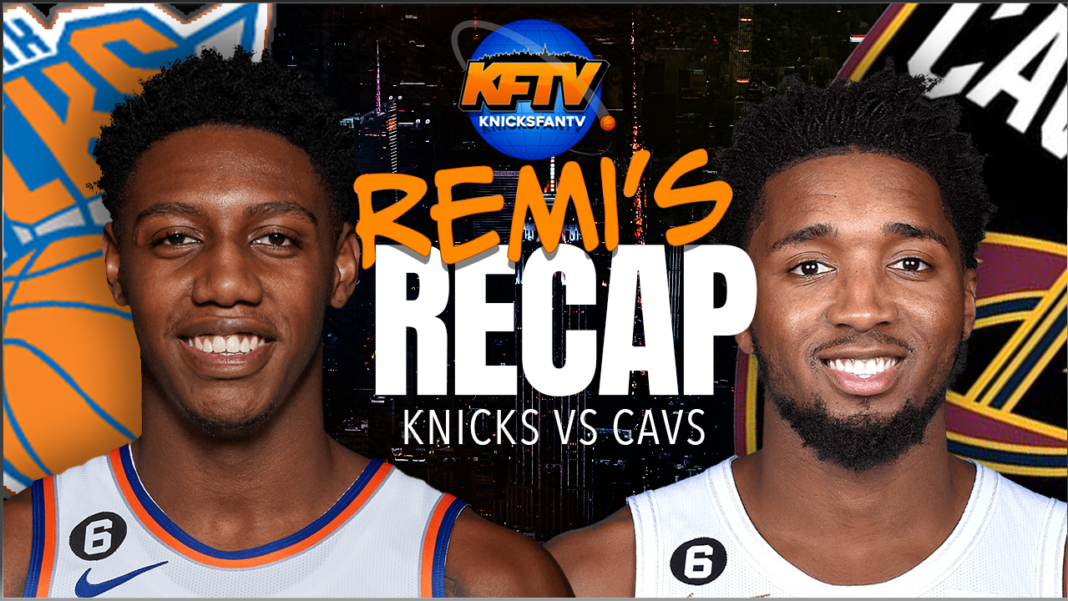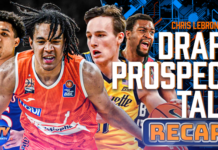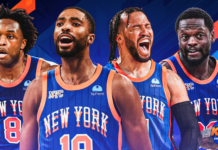The New York Knicks fall to the Cleveland Cavaliers 108-121. The Knicks lack of perimeter defense was their downfall.
Make sure to catch the whole Knicks Fan TV Postgame show on all major podcast platforms below:
• Spotify
• Apple Podcasts
• Google Podcasts
• Stitcher
The New York Knicks fell apart in the fourth quarter to lose to the Cleveland Cavaliers 108 to 121. The Knicks kept things close for most of the action by getting to the line and edging out the rebounding battle. The strategy led to momentum and a nine-point edge after three quarters. But New York’s perimeter defense failed all night, and when their offense cooled off, the Cavs took control.
Cleveland shot 46 percent from three, making 23 shots from range. They didn’t just allow 38 points to Donovan Mitchell but 29 to Kevin Love and 22 to Dean Wade. Until this team figures out how to disrupt the point of attack and break up shooters’ rhythms, they can’t compete with the league’s upper echelon.
But even a loss can show us paths to growth and progress. So let’s examine where there’s room to improve for this young Knicks team.
New York’s starters get sloppy at crucial moments
Jalen Brunson: 16 PTS (8/19 FG, 0/3 3PT, 0/1 FT), 7 AST, 4 REB, 3 STL, 1 TO in 34 mins
It took Jalen Brunson time to find success against Cleveland’s tough interior defense. He struggled early, with the Cavs’ big men disrupting his ability to get shots off inside. But during New York’s third-quarter run, Brunson pushed the pace and found opportunities to score.
Brunson played pesky defense, sneaking up ball handlers to force turnovers. He also contributed on the glass, not just picking up rebounds but poking a few potential offensive rebounds away from Cavs’ bigs. However, his height does hurt his ability to close out effectively, though.
Brunson needed a couple of jumpers to fall for his game to truly unlock. The Cavs sent big bodies and quality defenders at him. His inability to get going in the half-court meant he failed to take over down the stretch and the entire offense floundered. That leaves Brunson with a 2 out of 5 for his impact.
RJ Barrett: 15 PTS (6/10 FG, 3/4 3PT), 2 AST, 5 REB, 1 TO in 33 mins
There are signs of progress for RJ Barrett, but he’s still searching for his fit in New York’s offense. Barrett let the offense come to him for most of the night, hitting three-pointers and rarely forcing the issue otherwise. He finished reasonably well at the rim and might have earned free throws in a game with tighter officiating.
But by letting the game come to him, Barrett became more of a role player than usual. He still attacked at times, but the offense ran through Brunson and Randle. Unfortunately, that meant RJ’s most efficient game also saw him with fewer chances to strike when things fell apart in the fourth.
I had praise for Barrett’s defense after three quarters. But he gave up a pair of four-point plays off bad fouls on shooters. That’s unacceptable, especially because they came in the fourth.
Barrett’s performance is a step toward more efficient play. I don’t mind him taking time to get into a rhythm. But his impact was limited this time around, and he’ll need to be this efficient while inviting a heavier workload. So Barrett gets a 2.5 out of 5 for his night.
Evan Fournier: 16 PTS (6/9 FG, 3/5 3PT), 1 AST, 3 REB, 1 STL in 28 mins
This was my favorite performance from Evan Fournier for the year. He started the game by knocking down a three, followed by a midrange pull-up jumper. Fournier would continue to find his shot at opportune times. Quick decision-making paid dividends.
I also thought that Fournier turned in a better defensive effort in spells. He was activated enough to deflect a few passes and challenge some shots from Donovan Mitchell. Nevertheless, he’s still a limited defender, and Donovan Mitchell is good even against quality defenders.
The unfortunate reality: I don’t think the starting line-up’s defense can hold up. No matter how well Fournier shoots, if the starting unit can’t get stops, then they’ll need a change sooner than later. Fournier picks up a 2.5 out of 5 for efficiency and effort.
Julius Randle: 15 PTS (5/13 FG, 0/3 3PT, 5/10 FT), 7 AST, 9 REB, 2 STL, 4 TO in 33 mins
At times it felt like Randle slipped back into old habits in this game. But a large portion of that was necessitated by Cleveland’s defense against Jalen Brunson and RJ Barrett’s more passive approach. So Randle had to shoulder an offensive burden that saw him driving relentlessly.
Randle’s jumper continued to fail him, but he was efficient on drives to the basket. When he didn’t finish inside, he often drew fouls on his attempts. He kept Evan Mobley off balance and forced traffic his way. That led to some extra turnovers but also some nice dimes.
Last night wasn’t a great performance for Randle, but it was an effort that I can respect. The starters’ offense was sometimes timid, and the big man was the only person aggressive enough to force action. He has to get some jump shots to fall for a more positive impact, but this performance was neutral despite struggles. Randle receives a 3 out of 5 for leading New York’s best run of the game.
Mitchell Robinson: 4 PTS (2/6 FG), 1 AST, 7 REB, 1 STL, 2 TO in 21 mins
Foul woes are becoming a common issue for Mitchell Robinson. We can give him some leeway because of tough match-ups, but through 6 games, his backup has played more minutes. That’s not because Robinson’s been bad while he plays but because he can’t avoid foul trouble.
Offensively, Mitch was hampered by the Cleveland big men. His teammates didn’t connect on alley-oops, and his putbacks failed to fall in traffic. Robinson got his buckets from waiting in the dunker’s spot while slashers drew attention.
Mitch was solid on defense, keeping the Cavs’ bigs off the boards for most of the action. The team’s defensive rebounding flopped in the fourth, but that was a team issue. Overall, Mitch has one problem. That’s his foul trouble. Until Mitch can stay on the floor, he won’t get into rhythm or make an impact. As a result, Mitch gets a 2 out of 5.
Knicks’ Second unit players deserved more significant roles
Immanuel Quickley: 7 PTS (2/7 FG, 1/4 3PT, 2/3 FT), 3 AST, 3 REB, 1 TO in 19 mins
Immanuel Quickley’s night went similarly to most of the second-unit players. He had a lot of success in his first-half action but not so much in the second. IQ hit his first three-pointer, but his shot was off beyond that. His playmaking shined in transition, with impeccable precision on long passes and lobs.
But transition offense comes from stops, and the second unit couldn’t stack enough stops to hit a rhythm. Once Donovan Mitchell came on and propelled Cleveland’s offense, the New York fast break vanished. IQ’s offensive production disappeared with it.
I didn’t find Quickley standing out on defense, although he still represented a clear upgrade over Evan Fournier. I think it’s time to consider switching their spots in the rotation and letting Derrick Rose run the second-unit offense. Quickley’s shooting has been much better off the catch than the dribble. IQ gets a 2 out of 5 for his first-half success.
Derrick Rose: 7 PTS (3/5 FG, 1/2 3PT), 2 AST, 1 REB, 1 STL, 1 TO in 14 mins
Derrick Rose is rarely sloppy with the ball, but his handle was loose for his first stint on the floor. He looked out of control for a possession or two, which is exceedingly rare. Rose reversed the second-unit trend by struggling early but looking strong in the second half. His late success came from driving into the heart of the defense.
D-Rose finished back-to-back drives and appeared to be finding holes in the defense. But he was also approaching that 15-minute mark that I believe represents a minute restriction. So Rose came out of the game, and the Knicks’ offense sputtered the rest of the way. Rose gets a 2 out of 5 for an impact that couldn’t be fully realized in his brief action.
Cam Reddish: 7 PTS (3/6 FG, 1/2 3PT), 1 AST, 1 BLK, 1 TO in 16 mins
This performance might best represent the enigma of Cam Reddish. Every time he made an excellent play, he’d follow it with a questionable decision. Cam would make a tricky euro-step in the lane and follow that with an ugly, forced attempt.
Reddish was okay on defense or at least good compared to his peers. I’ve complained about the perimeter defense a lot already. That means Reddish failing to stand out is a compliment in this case.
Reddish made decisions bad enough to warrant quick hooks. He still flashed his offensive potential, but the inconsistency meant one or two mistakes for every good moment. So I’ll give Cam a 1.5 out of 5 for too many mishaps between positive plays.
Obi Toppin: 9 PTS (4/7 FG, 1/3 3PT), 4 REB, 2 TO in 15 mins
Obi Toppin looked incredible in the first half. He knocked down a three early and then drove for a double-clutch finish past Evan Mobley. His chemistry with Immanuel Quickley shined on a couple of fast-break connections between the pair. Unfortunately, his turn on the floor ended after one of those fast-break dunks.
The second half showed us where Obi has to improve. He continually drifted too far off Kevin Love, who was already shooting lights out. Toppin didn’t get any offense going. His defensive miscues led to a fast hook in the fourth quarter as Cleveland began to make a run.
This is a strange case. I wanted more minutes for Obi in the first half, but he deserved his benching in the second half. He wandered too far off good shooters and couldn’t recover for closeouts. The mixed-bag performance leaves Toppin with a 2 out of 5 for his impact.
Isaiah Hartenstein: 12 PTS (6/10 FG, 0/1 3PT), 1 AST, 9 REB, 1 STL, 1 BLK, 1 TO in 27 mins
The continued foul woes of Mitchell Robinson pushed Isaiah Hartenstein into another significant role. He responded by knocking down what felt like a limitless number of floaters. It’s not the prettiest shot, but it’s going in if Hart gets his floater off in space. I think he sets some of the best screens on the team, which makes short rolls into space more accessible.
Hart also had a spirited game defensively. He relies on energy and anticipation to make up for mediocre mobility, which usually works because of his massive size. But it does mean that Hartenstein can get caught a step behind or beaten by faster moves. It also means that if he challenges a shot, he has less chance to recover and position himself for the ensuing rebounds.
The other standout moment for the backup big man came between plays. Raul Neto was upset with IQ’s propensity for drawing fouls and tried to stare Quickley down. While Quickley was content to ignore the clownish behavior, Hartenstein stepped in and bumped Neto away. That’s a great sign of toughness and teamwork that characterizes Hart’s stints. The big man’s contributions add up to a 3 out of 5 for his presence inside.
An uphill battle for Tom Thibodeau and the Knicks
It’s tough to blame Tom Thibodeau for some of the Knicks’ current issues. While some changes might help the starting unit’s perimeter defense, the obvious solution is missing games due to a foot injury. Thibodeau cut the second unit’s time early in the fourth quarter, but that was an intelligent decision, as that group had no answers for Donovan Mitchell. Sadly, it felt like Thibs had no options to turn things around late.
Then again, I did feel frustrated that he stuck his usual substitution timing in the first half. Immanuel Quickley and Obi Toppin were sparking a run. But they still got the quick hook with the starters returning and the offense stagnating. It feels like Thibodeau is much quicker to ride a hot hand from a starter than to trust his bench before crunch time.
There’s also a potential scheme issue. All but two players were here last season. That hasn’t stopped the team from miscommunications, slow rotations, and poor three-point defense. That stems from poor defense at the point of attack and far too much drop coverage. Thibodeau might have some obstacles, but the coach has to find solutions when the same problems are repeated nightly. He gets a 2 out of 5 for this loss.
Closing Thoughts
The Knicks have lost back-to-back games by double-digits. The caveats are that they’ve faced two potential contenders and were reasonably competitive for most of those competitions. But that’s missing an important bit of information: The Bucks didn’t have Khris Middleton and the Cavs were missing Darius Garland. Yet, the Knicks lost by comfortable margins to teams missing their second stars.
Superstars are always tricky to stop, but New York has allowed the Grayson Allens and Dean Wades of the league look like beasts. Don’t forget Santi Aldama hit his career-high against the Knicks on opening night. The defense can’t contain role players, so it’s hopeless against the likes of Donovan Mitchell or Giannis Antetokounmpo.
It feels like we’ve been waiting for Quentin Grimes to come back and tighten up the defense. But his foot injury won’t seem to go away, and there’s no promise he’ll resolve all New York’s woes. They’re not built to defeat the better teams in this league as currently constructed.
Would Donovan Mitchell resolve that? Honestly, I don’t think so. The team would be more fun to watch but without the depth to last over a long season. In addition, they’d be left with even less defensive talent than prior.
New York has two days off before another quality opponent in Atlanta. The Hawks aren’t quite the Cavs or Bucks, but they have plenty of weapons to take advantage of porous perimeter defense. We’ll see if the Knicks can come up with a solution before Trae Young and Dejounte Murray get to work. I’ll see you then, Knicks fam!
Stay tuned to KnicksFanTV.com for the latest Knicks news, rumors, and recaps throughout the NBA season. And in case you missed it, check out Knicks Weekly, where CP, Alex, and the fans discuss the Knicks losing to the Milwaukee Bucks!











